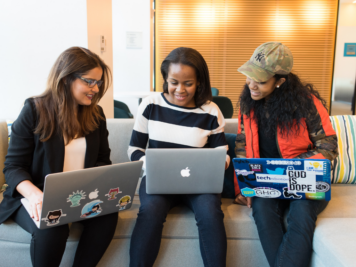This is a guest post by Kacper Niburski for Student Stories.
The first time I tried to join the humdrum of the work force was in grade 12. After two months of disapproving glances in McDonald’s while donning a suit and tie, handing resumes to anyone who would read them, and stressing over a comma here or there on a stupid paper that would most likely be thrown in the garbage, I was called to an interview for the zombie-shift at Costco.
“Lift. Place. Repeat,” they told me. I had no qualifications and this is exactly what they wanted in an applicant. For the first time in my short life, I was happy to be a real nobody. All I needed were arms, and god knows that I had two good ones.
You see, I was told that getting a job in this shambled-together economy was more difficult than winning the lottery because at the very least, people won that regularly. Employment, I was told, was like striking gold in the Sahara desert with nothing but your finger to dig with.
Whether this was true or not, I walked into that Costco interview at five in the morning rosy-eyed and cheerful. It was a beautiful winter day; the cold air was crisp and I stretched like the sun, greeting everything I saw with a smile and a nod. I might’ve even bounced when I stepped.
The interview came and went and I felt like I aced it. They asked me about ethics and I babbled on about Nicomachean versus more normative utilitarian approaches. They placed me in numerous situations – a man is on fire, some all-important Gatorade shipment has fallen, the works – and damn if I didn’t answer like the CEO would. Weaknesses? I had one of course: the incessant desire to always want to do things perfectly. Favourite animal? An ant because they work well in a team. Black or white? Issues are never black or white because gray colours this world and… blah, blah, blah.
I felt and still feel like I was never more prepared for the throes of professionalism as I was that day. Jump back to that morning and you could’ve even asked me a stock quote for Costco and I would have given it to you plus the third quarter projections with a wink of an eye and a shake of a hand.
And yet.
Two weeks later, my phone sat still like a dead fly. I bit my nails. I barely ate. And when I called them back hoping for the miracle of a managerial mistake, I was glossed over, asked who I was three times, and finally told, after waiting some fifteen minutes to what could unquestionably be the jazz-tunes of Hell, that I hadn’t received the job because all spots were filled and they were sorry I hadn’t made the cut.
Out of rash temerity, I asked what the cut was, then. Maybe because they had a bad drive in, or they had forgotten snacks in their lunch that day, or because I was just a snot-nosed brat parading around in a suit. Anyways, they said quite tersely, “Not you.”
To this day, I remember those words well, words I am sure that have been parroted in a variety of ways to a generation born in the time of “no, sorry, and please apply next year.” After I placed the phone down, I wondered if it was my fault, and in between now and then where failure after failure after wretched failure roared on before me, I convinced myself it was.
Yesterday those words and sentiments once again lingered as I read a recent article cycling among my friends entitled, “Why Generation Y Yuppies are Unhappy” by blogger wait but why.
Among the crude drawings and succinct, accessible writing is the idea that our Generation Y, those born from the 80s until the early 90s, are so miserable because we have expectations that do not meet the cold realities we face. Unable to meet our hopes through sheer work alone, the inequity grows from the fact that we believe, and have been led to believe, that we are entitled and special. All of us, from the self-absorbed Tweeter to the hermetic introverts, think of ourselves as unique fingerprints among other unique fingerprints, even if we aren’t.
This misplaced sense of self-importance ultimately leads to our inevitable but avoidable self-imposed sadness. And in order to quell this misery and feed the insatiable gnawing of our narcissism, we become lazy, self-righteous sloths who undeservedly document our life on various social media platforms. We become a perpetual problem, not a solution.
Though it is beyond the scope to offer an entire summation of my generation and any sweeping generalization will fail on a variety of accounts, I want to say that the article was horseshit.
To have the audacity to say otherwise, to say that I’m my own problem because I am so green and inexperienced and why don’t I just have a job yet instead of quibbling on and on, is insulting. It’s downright laughable.
Before me and before my generation was penned as being so apparently unhappy and consequently hedonistic, before I even applied to Costco, the future looked bright. The early 20th century promised wonders of scientific inquiry that spurred great innovation and progress. Then war, destruction, and war came again, and the future was pissed away on endless battles, an addiction to fossil fuels, and a financial climate that provided hand outs for bankers and hand outs for everyone else.
Now, unlike ever before, our generation is choking on college debt, toiling under unpaid internships, suffering the consequence of weakening unions, poor job prospects, housing markets that have the volatility of a tropical storm, worsening and worsening education that somehow keeps rising in price, and despite it all, the article claims that we are to blame for this aggregate of misery because we just can’t sink our teeth into the mold and smile while getting punched from all sides.
Part of me feels that our self-motivated drives of frivolity – the sins of Facebooking, Instagraming, and Pintresting that the article suggests have come to both define and nullify our generation – are a way to forget about all of these problems if only a little while. It is a way to think that maybe not everything is going to shit and even if it is, we can try to have fun while swimming in the crap of others before we drown.
And yet I also feel that while this may be true quantitatively and the previous decades of being roaring drunk on petroleum may have very real concerns and consequences for my generation and myself, it is just as wrong of a viewpoint. In fact, such an approach is no different than article itself; it simply displaces the blame from myself to the people before me.
Any kind of role reversal is detrimental. Like the old generation who harp on about the young and like the young who nag on about the old, every generation complains about one another. We are no different. Our younger selves will be no different. The ones after that won’t be either. And so on.
What is seen as delusional obsessions in us is really just the same hogwash recycled again and again and again with great accessibility generation after generation after generation. Like other youths with their problems at various times for various reasons, whether it be wars or famine, burgeoning industrial cities or idyllic farmlands, the skepticism of religious phenomena or the settled belief in them, the helter-skelter environments we all found ourselves in promoted us to feel special even if we aren’t. Especially if we aren’t.
Not because we necessarily are special but because like all the generations of yesteryear who were belittled by their elders just as we are now, Generation Y isn’t the problem. We are the only solution. We are all the future has. And we must believe this wholeheartedly.
When I failed to receive that Costco job, I learned all this by understanding that I wasn’t vitally unique or even mediocre really. I also learned that I wasn’t part of some grander ponzi scheme I was born into. Sure the economy was bad, but it was bad for everyone else all the same. Instead, such a rejection taught me that if only I got up, applied to other jobs, and kept that smile on my face even if it was fake at times, I’d ensure my arms would be good for something, even if they weren’t lifting packages. Example: writing.
I still feel that. If we are to make any difference at all, then we must stop these patterns of cross-generational bickering. We are all together on a tightrope of planetary consequence. Any which way, and we’ll slip into the same excesses or eventual catastrophes aforementioned. One wrong step and poof – there goes the future.
But together, if we all take our weaknesses and strengths and combine them to complement each other like I did after my failed foray into professionalism, then we can ensure that when the next generation complains about us, they’ll complain about how good it is rather than bad and we – reduced to nothing more than bags of sagging skin and graying hair – will be able do the same.
About Author:
Kacper Niburski is a student whose acceptable level of pretension doesn’t allow him to write biographies, lest he succumb to bragging or using words like lest. Email: kacperniburski [at] hotmail.com




